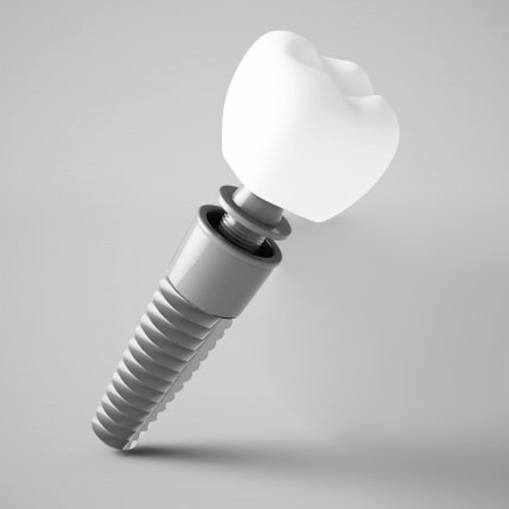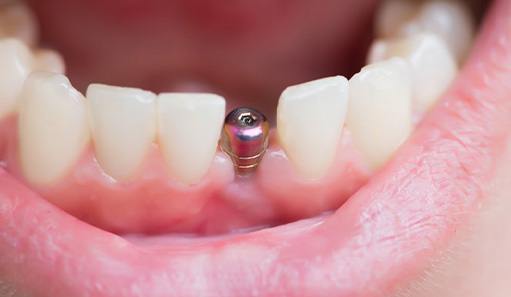Dental Implants – Oshkosh, WI
Make Your Next
Tooth Replacement Modern
Dentistry has only gotten more and more advanced over the years, and dental implants are just one of the reasons why. While tooth replacement can be done in multiple unique ways, dental implants take traditional treatment a step further by replacing the root and the crown, fully rejuvenating your smile and long-term oral health simultaneously. Partnered with some of Oshkosh’s top implant specialists, Dr. Heil and his team are ready to make chewing food, at-home care, and smiling easy once again, so give them a call to get started with dental implants in Oshkosh, WI!
Why Choose Oshkosh Complete Dentistry for Dental Implants?
- Partnered with Local Specialists
- Calming Sedation to Keep You at Ease
- High-Quality, Natural-Looking Restorations
What is a Dental Implant?

A dental implant is a unique restorative tooth replacement made up of three main components. This includes the titanium implant itself, the restoration (whether it’s a crown, bridge or denture), and the abutment that attaches these two components together. They can be used to replace single teeth or all the teeth in a given arch. While they do require oral surgery to place, they offer a level of functionality, esthetics, and longevity that is truly second-to-none.
How Dental Implants Work

Dental implants must occur in phases because the implant requires time to heal effectively. Following your consultation and examination at our dental office, Dr. Heil partners with a local specialist to have the placement and restoration phase of treatment completed. In the first stage of treatment, the implant is placed and given time to heal. In the second phase, the abutment is then placed, given additional time to heal, and the crown is placed on top.
The 4-Step Dental Implant Process

Placing dental implants is a specialized multi-step process that takes several months to complete, and while this may sound like a long time, the result is a permanent and beautifully lifelike dental restoration. At Oshkosh Complete Dentistry, we partner with local specialists to ensure that our patients receive effective care and achieve remarkable outcomes. While every patient has unique needs, the dental implant placement process involves four main stages: the initial consultation, placement surgery, osseointegration, and the placement of the final restoration.
Initial Dental Implant Consultation

The journey to receiving dental implants begins with a consultation with Dr. Heil, during which he will evaluate your oral health and review your medical history to determine if you can be a good candidate for them. You may require preliminary treatments such as gum disease therapy or bone grafts before receiving implants, and we can begin developing your treatment plan as soon as your mouth is in suitable shape. We’ll also take care to ensure that you understand what you can expect on the road to receiving implants as well as the associated costs.
Dental Implant Surgery

We partner with qualified specialists to ensure our dental implant patients receive top-quality care from experienced and reliable providers. Dental implant surgery begins with the oral surgeon administering a local anesthetic to render the process painless, and you may also receive sedation treatments if you need more help sitting comfortably through the procedure. They will then make an incision in the gum tissue, insert the titanium posts of the implant into the jawbone, close the wound, and fix a protective cap on top of the post.
Dental Implant Osseointegration & Abutment

Osseointegration is the natural process that allows the titanium of your dental implant to fuse with the tissue of your jawbone, creating a sturdy foundation that allows the restoration to last for a lifetime with the proper care. Once your implants have fully integrated with your jaw a few months later, you will receive another minor surgery to place an abutment piece on top of the post, and your final restoration will be crafted during the several weeks when you are recovering from this procedure.
Delivery of Dental Implant Restoration(s)

When we receive your restoration (likely a crown, bridge, or denture depending on the number of missing teeth), you’ll return to our office so we can securely anchor it to your implants. After any final adjustments to make sure the appliance fits and functions properly, you’ll be ready to greet the world with your newly transformed smile.
Benefits of Dental Implants

Because dental implants replace the root of teeth, you can expect many of your tooth’s previous functions to come back. For example, your biting strength increases, making it easier to enjoy your favorite foods. With a success rate as high as 98 percent when placed by a trained professional, you can expect your implant to last up to 30 years or longer when you practice routine oral care. Furthermore, blood flow is reestablished when you replace a missing tooth in this way, which means your cheeks will not hollow out and retain their elasticity.
Additionally, dental implants are strong enough to hold restorations entirely on their own. This means you won’t have to sacrifice existing tooth enamel just to fill the gap in your smile. It’s truly the best long-term solution for tooth loss, even if it takes longer to complete treatment.
Who Dental Implants Can Help

At your initial consultation with Dr. Heil, he will learn about your dental history, conduct an oral exam, review your X-rays, and ask you a few questions about your lifestyle and smile goals. With all of this information, he can determine if dental implants are right for you. Not only that, but he can recommend how many you need to achieve the complete, healthy, and confident smile you deserve.
Who Is a Good Candidate for Dental Implants?

Dental implants are popular for numerous reasons, including the fact that they can last for several decades with proper care. If you are interested in replacing one or more missing teeth with this state-of-the-art service, then it’s time to schedule a consultation with Dr. Heil! That way, he can determine the density of your jawbone, assess the condition of your gums, and make sure you’re ready to commit to good habits, like brushing and flossing consistently. The good news is that many patients are candidates and, if you aren’t for one reason or another, we can rebuild your smile with a dental bridge or denture instead.
Missing One Tooth

If you are only missing one tooth – whether it’s a front one or a back molar – we have good news: dental implants are an option! The first step is placing a single implant inside of the jaw. Then, we will give it time to heal and integrate with your existing bone and soft tissue. Once that’s complete, a permanent restoration, which is made from natural-looking porcelain, is placed on top. The entire structure of your tooth will be replaced, making your dental implant look and feel just like the real thing.
Missing Multiple Teeth

Replacing a series of teeth, including multiple consecutive teeth or teeth on opposite sides of the mouth, is done with either a bridge or partial denture. While traditional restorations like these are held in place with dental crowns or metal framework, we offer another solution: dental implants! This ensures added stability, a lifelike appearance, and a longer lifespan. Plus, it’s actually easier to replace multiple teeth at a time, making it a more convenient and cost-effective solution.
Missing All Teeth

Just because you are missing all the teeth in your top or bottom arch doesn’t mean you need to settle for a traditional denture. Instead, you can have a series of dental implants placed throughout your mouth (generally four to six). Then, a custom denture is designed with your unique aesthetic goals and face shape in mind. Once it’s ready and you’ve healed, we attach your restoration to the dental implants, improving the stability and longevity of your prosthetic.
Understanding the Cost of Dental Implants

We realize that a major concern for patients about dental implants is the amount they’ll have to pay. Unfortunately, there’s not an easy way to estimate a price in general for dental implants because there are so many factors that go into calculating the cost. We really won’t know how much dental implants will cost you until we’ve had a chance to examine your mouth and fully understand your needs in a consultation. At that point, we can provide a treatment plan with a more precise estimate.
Preliminary Treatments & Dental Implant Surgery

When it comes to costs, it largely depends on the number of implants you are getting and whether or not you need preparatory treatments beforehand. If you require procedures like gum disease therapy, bone grafting, tooth extraction, or more, they can add to the overall cost you pay. But these procedures are sometimes essential for the implants to be successful and improve your oral health in general, making them well worth the time and funds.
The Parts of Your Dental Implant

Just as there are various brands and models of cars, dental implants may differ in price and quality based on the manufacturer. During your consultation, when we assess your needs, we can more accurately determine which implants would best suit your smile, allowing us to provide a clearer idea of the price of treatment. Also, it’s important to keep in mind that the price will depend on what kind of restoration you receive. Obviously, implant dentures will cost more than a simple crown. The more teeth you are replacing with your restoration, the higher the price is likely to be.
How Dental Implants Eventually Pay for Themselves

Dental implants are considered to be a long-term investment that lasts for many decades, which is not something that can be said for normal dentures or bridges. On top of their longevity, functionality, and lifelike esthetics, dental implants remain largely cost-effective over time, even if they are generally worth more upfront than other options. In other words, you pay for the cost of dental implants upfront and avoid having to pay for replacements down the road.
Does My Dental Insurance Cover Dental Implants?

Most dental insurance plans do not cover much of the cost of dental implants treatment. This unfortunately means that you’ll be responsible for paying most of the total out-of-pocket. However, some plans may provide partial coverage for preliminary work, like gum disease therapy, and for the restoration that is attached to the dental implants. When you see us for your consultation, we can review your policy and find as many ways as possible to reduce your out-of-pocket costs.
Making Dental Implants Affordable

Although insurance may or may not be helpful, chances are that you’ll need to pay most of the cost of treatment upfront. However, with financing through CareCredit, you don’t have to take on the entire total right away. You can pay for your dental implants at a reasonable monthly payment with little or even no interest. When you decide to move forward with implants, we can guide you through the application process with CareCredit and try to answer your questions.
Maintaining & Caring for Your Dental Implants

Dental implants are capable of keeping your smile complete, strong, and healthy for a lifetime. However, that’s only the case if you take proper care of them and protect them against damage and infection along the way. At Oshkosh Complete Dentistry, we’ll provide you with everything you need to know to keep your implants firmly rooted in place for years to come. If you want to learn more about how to maintain your newly rebuilt smile, continue reading or call our office to speak directly with a member of our team!
Make Oral Hygiene a Priority

Even though dental implants can’t get cavities, that doesn’t mean you can slack off on your oral hygiene. You must have a solid at-home dental care routine to keep harmful bacteria from attacking your gums. By taking proper care of your new smile, you can ward off oral health issues and prevent dental implant failure. All you need to do is brush at least twice a day, floss daily, and rinse with an ADA-approved mouthwash to keep your mouth in its very best shape.
Eat a Healthy Diet

Once you’re all healed up, you’ll be able to eat almost any food you want! However, be sure to avoid overindulging in hard, sticky, sugary, and highly processed foods as they can be detrimental to your implants. Instead, you should stick to a healthy diet full of nutrient-rich foods (i.e., fruits, vegetables, whole grains, lean proteins, dairy products). What’s more, eating foods rich in calcium and vitamin C will keep your jawbone strong and gum tissue healthy.
Break Bad Habits

Do you smoke, bite your fingernails, chew on pens or pencils, use your teeth as tools, or munch on ice? While these habits may seem harmless, they can destroy your natural enamel and dental implants. Luckily, you can keep your smile safe by kicking these habits to the curb. It’s a good idea to keep some sugar-free gum in your pocket for times when you feel tempted to chew on a non-food item. If you need help quitting smoking, ask a medical or dental professional for assistance – they’ll be able to provide you with the resources, support, and guidance needed to make the feat as easy as possible.
Protect Your Dental Implants

If you regularly play sports or grind your teeth at night, you should ask Dr. Heil about a custom-made oral device. An athletic mouthguard can protect against oral injuries, while a nightguard can prevent serious damage to your enamel and implants. Plus, they can help you avoid chronic jaw pain that can potentially lead to temporomandibular joint disorder.
Schedule Regular Dental Checkups

Aside from practicing good oral hygiene, you’ll need to visit Dr. Heil every six months for a checkup and cleaning to keep your smile in optimal condition. These preventive visits allow him to monitor your implants and spot developing problems. By catching any issues early on, you can avoid needing more costly and extensive dental work down the line.
Dental Implant FAQs

Want to know more about dental implants before making any decisions? We can help! Below are answers to some of the most common questions we hear from patients about implant treatment. Choosing how to replace missing teeth is an important decision that involves many factors. To learn more about dental implants and whether they are right for you, schedule an initial consultation with Dr. Heil, an experienced implant dentist in Oshkosh.
How Successful Are Dental Implants?
When placed by a skilled professional, dental implants can have a success rate of over 95%. Dr. Heil partners with a trusted local specialist for the placement phase of implant treatment. Once your dental implants are in place, you will need to follow the aftercare guidelines we provide you. Practicing excellent oral hygiene at home, eating a healthy diet, and attending regular checkups will help ensure your implants heal properly and stay in a great shape. The success of dental implants can also vary based on the location of the implant in the mouth. In general, molars receive more strain from chewing than front teeth, so they may be slightly more likely to fail.
Do Dental Implants Make You Look Younger?
Yes! Dental implants in Oshkosh can help you restore or maintain a more vibrant, youthful appearance. They accomplish this by stimulating your jawbone, just like natural tooth roots do. When teeth go missing, the jawbone loses that stimulation and begins to deteriorate. Because the jawbone can no longer support the facial structures, you may eventually appear more wrinkled, with a sunken-in face and fine lines around your mouth. Dental implants are the only type of replacement teeth that can stimulate the jawbone and prevent the bone deterioration that makes you look older.
Am I the Right Age for Dental Implants?
Most dental professionals will not place dental implants in patients younger than 18. This is because people’s jaws typically are not fully developed until young adulthood. In general, men’s jaws take longer to develop than women’s jaws do. If dental implants are placed before the jaw is finished growing, it could interfere with further bone development and potentially result in complications.
For older patients, there is no upper age limit for dental implants. However, senior citizens may be more likely to have other health issues that complicate dental implant treatment. Dr. Heil can confirm whether you are a good candidate for implants after examining your mouth during an initial consultation.
Can I Get Dental Implants If I Smoke?
It’s possible to get dental implants if you are a smoker, but you should know that you will have a higher risk of implant failure. Smoking tobacco causes dry mouth, slows down healing, and can interfere with implants’ ability to integrate with the jawbone. If an implant does not heal properly, it will likely be unable to support a crown or other restoration. Smoking can also cause dry socket, a painful condition that occurs when the protective blood clot is dislodged from the implant site after oral surgery. If you are planning on replacing your missing teeth with dental implants in Oshkosh, now is the perfect time to kick the habit!
I Need a Checkup & Cleaning I am Looking for a Dentist for My Child I am Concerned about Bleeding Gums I am Concerned about Sleep Apnea I Have a Cavity or Broken Tooth I am Missing One or More Teeth I am Unhappy with My Smile I Want a Straighter Smile I am Scared of the Dentist I am in Pain & Need Help View Our Services
